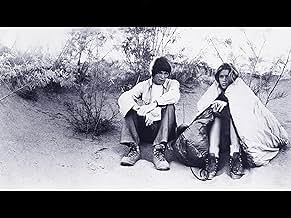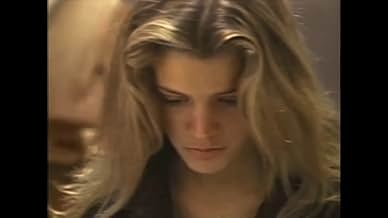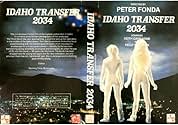Scientists at a government-funded research complex use a time machine they developed to secretly 'transfer' young researchers fifty-six years into the future after they discover Earth is soo... Read allScientists at a government-funded research complex use a time machine they developed to secretly 'transfer' young researchers fifty-six years into the future after they discover Earth is soon to suffer a worldwide disaster.Scientists at a government-funded research complex use a time machine they developed to secretly 'transfer' young researchers fifty-six years into the future after they discover Earth is soon to suffer a worldwide disaster.
- Karen Braden
- (as Kelley Bohanon)
- Elgin
- (as Roy Ayers)
- Judy
- (as Judy Motolsky)
Featured reviews
Briefly the story revolves around a group of student scientists who have developed a time travel portal which delivers them to the same locale some few decades in the future. Discoveries are made, things happen, etc.; of necessity I can tell you little more without spoiling, what other reviewers rightfully refer to as the "punch line". I'd say it was positively Swiftean in its social satire as the best science fiction often is. Idaho Transfer is a wry, tragic, amusing, horrific, cautionary little tale somewhere between the much-upon-us worthiness of "Silent Running", and the full-blown apocalyptic satire of "A Boy and His Dog", and certainly deserving of the same cult status. It is also, I believe, Peter Fonda's directorial debut, and would be of interest to his fans for that reason alone.
The problem obviously is, virtually everything else about the film. Poor direction, no budget, unknown actors who are a mix of needing a chance to show what they can do, and should never act again.
You find yourself constantly wishing this were remade with a better director with a budget. But it's still interesting enough that I watched to the very end, wanting to see what happens.
IDAHO TRANSFER is a curious little item made under obvious financial constraint by some of the era's more adventurous personages on the indie film-making fringe. Though mostly off-target, it does benefit from capable direction, an intriguing premise, and a clever, trenchant conclusion.
This isn't your run-of-the-mill science-fiction story, nor is it a wonderwork of special effects wizardry. It's a subdued film...an earthy, phlegmatic "anti-Hollywood" undertaking which had the potential to materialize as something greater than it is. Sadly, the feeling is more of indifference than enthusiasm at the pith of this project. By and large, IDAHO TRANSFER feels like a vague transparency of what it intended to be...the film's concrete-minimalist iconography is utterly de-trop, as is the intentional and somewhat dissociative impassivity of the cast. They approach their roles with, presumably, veristic inspiration...that method of "non-acting" which aims to italicize a mien of hyper-realism. The poker-faced performances in play could only be called "realistic" if reality was a world full of freshly lobotomized potheads with a collective Asperger-ish countenance. There's an irony here, however...oddly enough, the aforementioned shortcomings also give rise to a unique atmospheric carriage of cold austerity. It is this air of encircling paucity and lost, lonely detachment which gives IDAHO TRANSFER an interesting singularity of sorts. It's a misfire, more than not...but to its credit, it's a misfire comparable to little else.
5/10.
Director Fonda has merged the youth movement culture of the early seventies with the sci-fi genre, affecting a creatively unique and stylishly photographed film that would surely attract cult status. While the themes are heavily symbolised (you really need to find the meaning beyond the text here), the dialogue somewhat lacking narrative context, and the characters shallow, the film still packs a punch. Bruce Logan's cinematography in a barren Idaho wilderness is a highlight, while performances by the unknown cast (save for Keith Carradine in a small role) range from rank amateur to semi professional at best, although this doesn't diminish the overall impact.
Quirky (the time transporter has to separate metal from mineral matter and so the researchers commute sans pants owing to the zippers) and experimental looking, there's an apparent allegorical message about mankind's custodianship of the planet, and the role of youth in arresting its decline which will either hit or miss depending on your preference for sci-fi rendered social commentary. And while forbearance is required to accept some of the events depicted in the film (e.g. there's a character who's head is seemingly beaten to a pulp with a rock in a sustained, frenzied attack, yet bares little more than a scratch), if you persevere, you may be rewarded.
Unfortunately the interesting ideas are executed sloppily, as the screenplay is underdeveloped and director quite doesn't manage to tie everything together leaving many blanks unfilled. As most of the cast were not professional actors the acting is uneven and occasionally wooden, but it is compensated by gorgeous cinematography and scenery shots.
By far not the greatest science-fiction movie by the icon of counterculture and indi filmmaking, but original and interesting enough to give it a shot.
Did you know
- TriviaThe film was released theatrically in 1973 for only a limited time, as the distributor, Cinemation, went bankrupt during the first week the film was released. Only in 1988 did the film resurface on video, through MPI Home Video. Only this version has Peter Fonda's opening remarks about the environment. Subsequent DVD releases do not include this.
- GoofsWhen Karen returns to the camp to find everyone dead, in the establishing shot her face is caked with dirt, but in subsequent close-ups, and all other shots, her face is clean.
- Quotes
Future Girl: Are you sure that was one of them?
Future Woman: Of course it was.
Future Girl: What happens when we run out?
Future Woman: We just put another one in. We won't need another for quite a ways.
Future Girl: I didn't mean that. I meant, what if we run out of all of them or we can't even find any?
Future Man: They'll figure out another way for us.
Future Woman: We can use something else.
Future Girl: But what if that's too hard or expensive and what if they decide they can't change? We'll use each other then, won't we?
- Crazy creditsEsto Perpetua
- Alternate versionsVideo has a 1988 introduction by Peter Fonda speaking about environmental awareness.
- ConnectionsReferenced in My Own Private Idaho (1991)
- How long is Idaho Transfer?Powered by Alexa
Details
- Release date
- Country of origin
- Language
- Also known as
- Expedition in die Zukunft
- Filming locations
- Production companies
- See more company credits at IMDbPro
























